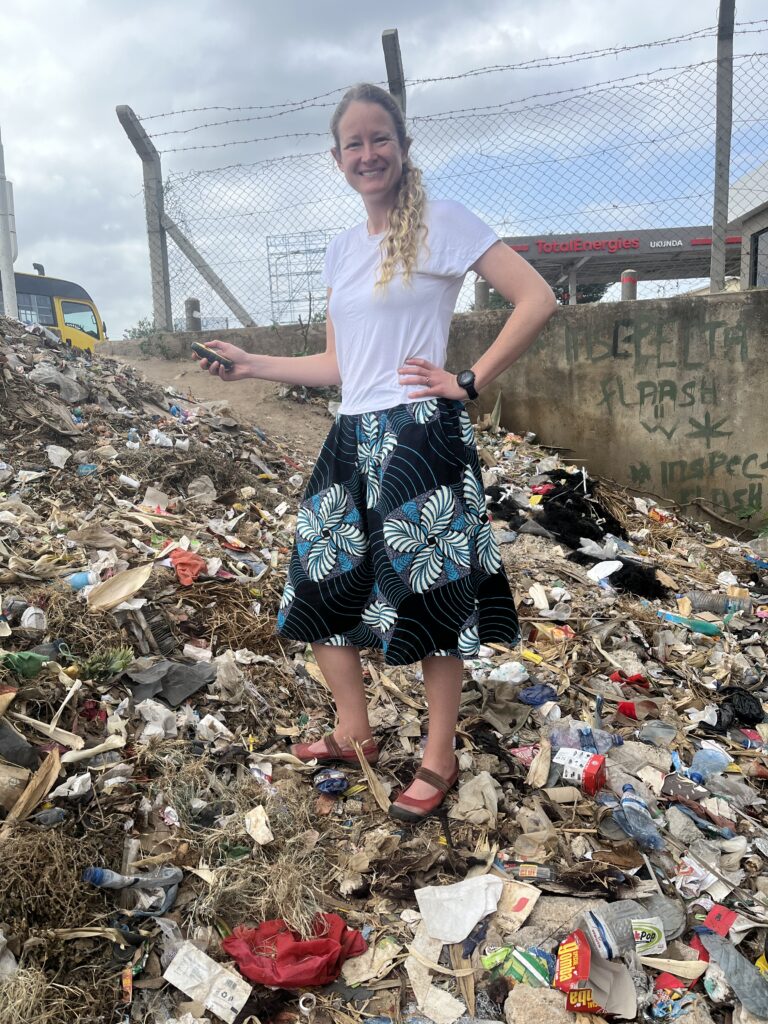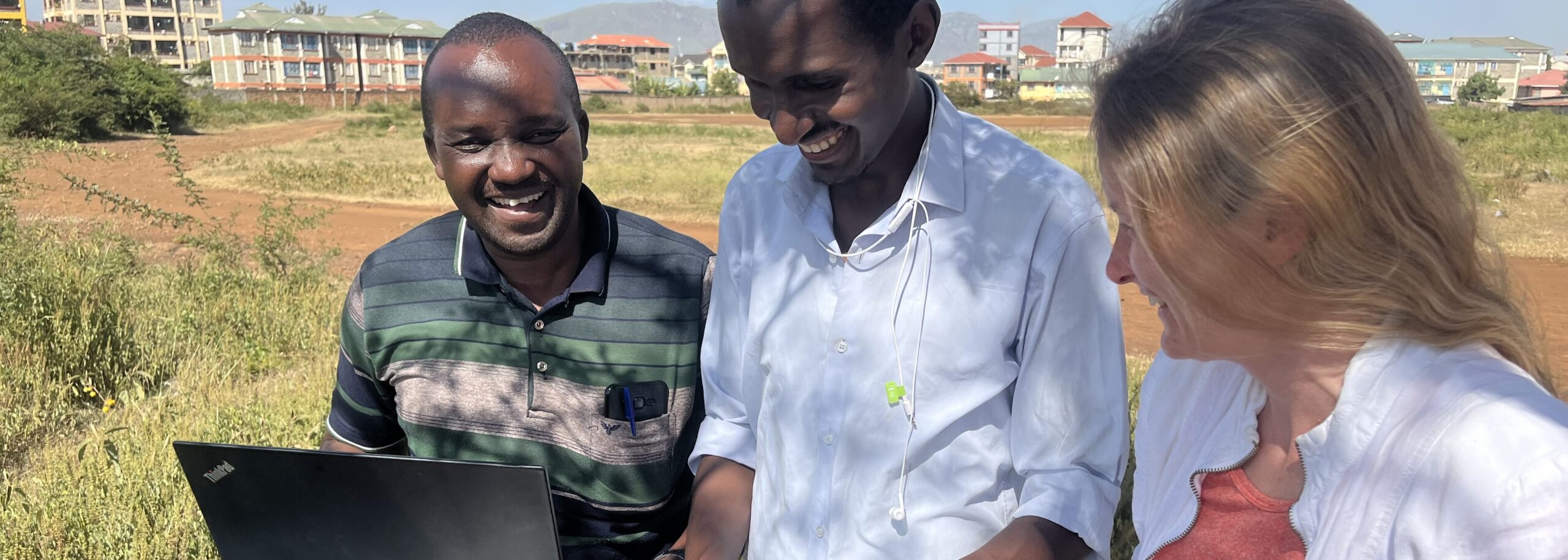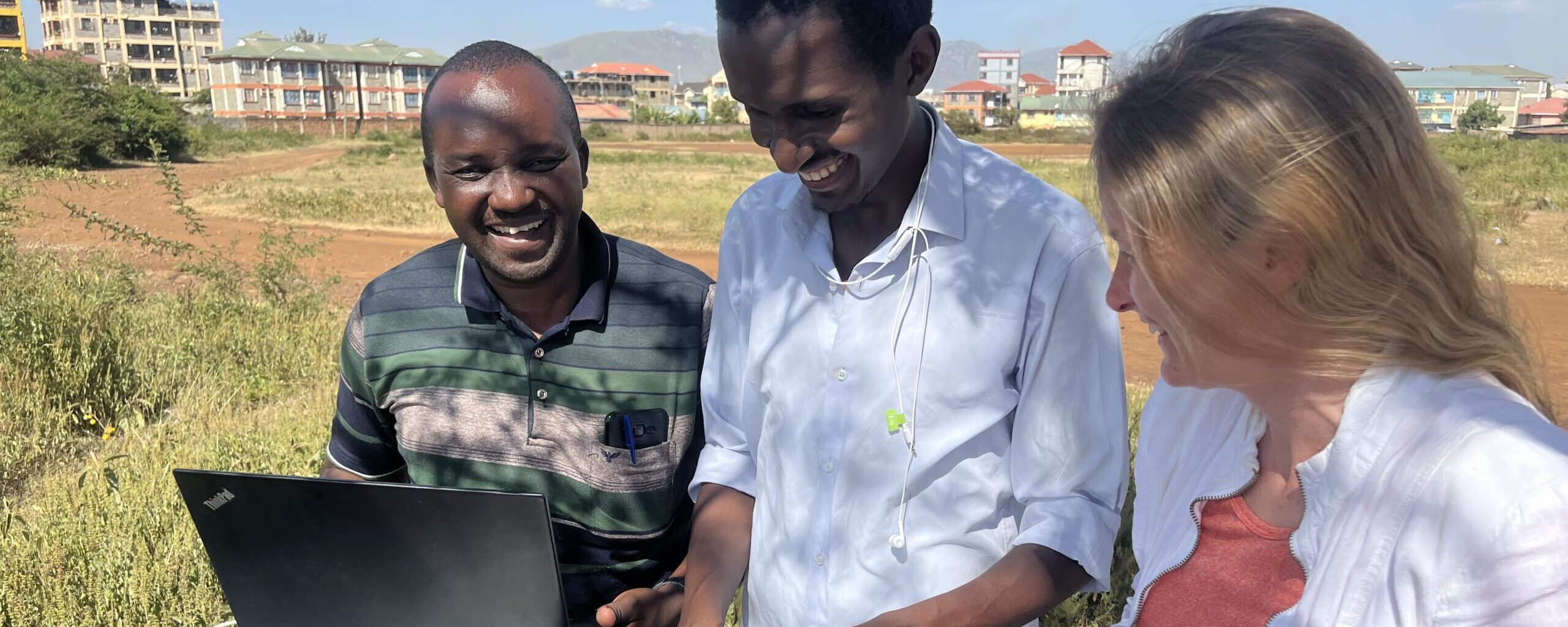Published: 10/19/2023
By Jamie Hansen, Communications Manager
Cover photo: Dr. Joelle Rosser collaborates with Kenyan colleagues to assess the risk of trash as a breeding ground for mosquitoes using drones.
As a girl, Joelle Rosser was inspired by Jane Goodall and a love of the natural world. She dreamed of becoming a primatologist whose research could inspire conservation.
Many years later, her passion for the environment remains, but it has led her in an unexpected direction.
Rosser, MD, joined Stanford as an infectious disease fellow in 2018 and has cultivated a research career understanding how climate change impacts infectious diseases. Now, with more than $1 million in funding from the National Institutes of Health, she’s collaborating with leading Stanford global health researchers on projects that empower communities in Indonesia and Kenya to protect themselves from growing disease risks while also preserving their local environments. She’s accepted a new position as an Assistant Professor at Stanford.
She credits her career trajectory to Stanford’s unique support for climate change and health research, and the mentors she’s found here.
“I chose Stanford and have thrived because of the environment here, where people are thinking creatively about how we develop this emerging field and believe that it’s possible and important to do this work,” she said.
I chose Stanford and have thrived because of the environment here, where people are thinking creatively about how we develop this emerging field and believe that it’s possible and important to do this work.
Joelle Rosser, MD
From Conservation to Human Health
In college, Rosser’s passion for primatology led her to complete an undergraduate thesis on community-based conservation in Tanzania. There, she saw that conservation efforts not only benefited primates and the environment – they were also crucial to human health. She continued to work on health issues in Tanzania after graduation.
Through her work, she began to believe she could have a greater impact on environmental issues by showing the relationship between human health and the environment. She decided to pursue medical school.
Following her residency, she interviewed for a fellowship with Steve Luby, MD, director of research for the Stanford Center for Innovation in Global Health (CIGH). She learned about a project to help build climate-resilient water infrastructure in communities in Indonesia and Fiji. The focus on community-based interventions that used innovative technology and conservation methods to protect human health resonated immediately with Rosser.
“Hearing about this work, I knew Stanford was where I needed to be,” Rosser recalled. She accepted the fellowship and joined Luby’s research efforts.
“Joelle is a new type of infectious disease physician, a type of physician that the world desperately needs as we face progressive climate change,” Luby said.
Tackling Climate Change and Mosquito-Borne Diseases
In 2020, Rosser, Luby, and colleagues secured a Global Health Seed Grant from the Stanford Center for Innovation in Global Health to support their project. Initially, they aimed to investigate a nature-based intervention to tackle the bacterial disease leptospirosis in informal settlements in Indonesia and Fiji. Their intervention, known as RISE (Revitalizing Informal Settlements and their Environment), takes a nature-based solutions approach. It seeks to upgrade entire water infrastructures to build communities resilient to the impacts of climate change, including flooding and infectious disease.

However, their plans were interrupted by the onset of the COVID-19 pandemic shortly after receiving the grant. In response, they shifted to a related initiative that seemed more feasible given pandemic conditions. They would assess RISE as an intervention for the transmission of arboviruses – often deadly diseases transmitted by mosquitoes and other insects. The Indo-Pacific region was already a hotspot for arboviruses like dengue fever and chikungunya, and researchers believed that climate change would only intensify the burden.
The first step was understanding the baseline risk for such diseases. While blood samples were taken before the pandemic, conditions prevented Rosser from traveling to Indonesia and Fiji to test them until this spring. The high rates of prior illness these tests revealed were remarkable: roughly half of children tested in Fiji showed evidence of prior dengue virus infection; in Indonesia, about one-third. Because second dengue infections are often more severe, preventing dengue for these children is especially important.
Rosser has now received a $1 million K23 Career Grant from the National Institutes of Health to track a cohort of young children in these communities over several years. She will use this data to assess whether the RISE intervention has an impact on childhood infection rates. For the RISE intervention, Stanford researchers are collaborating with local physician-scientists, ecologists, architects, engineers, and community organizers to minimize trash, enhance rainwater collection, and establish natural flood buffers.
These actions can collectively reduce mosquito breeding grounds while making communities more resilient to the increased droughts and floods expected with climate change. Both droughts and floods can worsen mosquito-borne disease, Rosser said.
“RISE is really exciting because it’s solution-oriented,” Rosser said. “Climate change is already having enormous impacts. We need to start designing and testing ways to make communities more resilient.”
A new way to understand trash

While at Stanford, Rosser reconnected with another mentor, Desiree LaBeaud, MD, a Stanford professor of pediatrics (infectious diseases), and a leading researcher on the interplay between arboviruses, the local environment, and climate change. They had previously collaborated while Rosser was in medical school at Emory University.
LaBeaud, who works extensively in Kenya, had discovered that certain types of trash provided an important breeding ground for the Aedes aegypti mosquito which spreads dengue, chikungunya, and other serious illnesses. LaBeaud and her Kenyan colleagues wanted to better understand the makeup and distribution of trash in Kenyan communities in order to inform prevention efforts.
Rosser joined LaBeaud as a Global Health Equity Scholar, funded by the Fogarty International Center and hosted by CIGH. She designed a study to use professionally gathered drone footage and ground surveys of two Kenyan communities, Kisumu and Ukunda, to gain a deeper understanding of the types of trash found there and what they mean for disease risk. This method of mapping trash exposure and disease risk by drone could be useful in many other areas impacted by dengue, including Indonesia and Fiji, Rosser said.
This spring, Rosser spent two weeks walking through rural and urban Kenyan communities alongside local leaders and entomologists, analyzing every pile of trash they encountered, discussing their findings with local entomologists, and comparing the ground assessment to the drone images.
Through this experience, Rosser gained a new way of seeing and thinking about trash.
“Not all trash is created equal,” she said. “For instance, trash by the roadside often doesn’t present as great a risk because the water is more likely to evaporate or be trampled before becoming a breeding ground. Trash that was hidden away was more likely to hold stagnant water for mosquitoes to breed in.”
Now, Stanford students are assessing the data and classifying trash into higher and lower risk categories. Then, Rosser and her colleagues will analyze which areas are at greatest disease risk. Their work builds upon prior dengue research conducted by LaBeaud and colleagues in these communities.
Rosser and LaBeaud hope the findings can help communities in Kenya and beyond understand the risk associated with different types of trash and prioritize interventions such as trash cleanups and recycling.
A growing career
As Rosser moves into her new position as an Assistant Professor at Stanford, she maintains her longtime passion for conservation and ecology. Now, however, she also brings an avid interest in innovation and a deep commitment to working alongside communities most vulnerable to climate change to support their ability to adapt.
“Joelle’s compassionate, interdisciplinary, community-centered approach to addressing challenges around climate change and health illuminates the value of women’s leadership in tackling these complex and growing problems,” said LaBeaud.
Rosser credits the Global Health Seed Grant and Global Health Equity Scholars fellowship with helping shape and launch her career as a climate and health researcher.
Mentors like LaBeaud and Luby have shown her by example how to build strong collaborations across disciplines with international collaborators, she said.
We’re all going to need to adapt, and we can learn a lot by helping communities that are impacted first.
Joelle Rosser, MD
“We’re all going to need to adapt, and we can learn a lot by helping communities that are impacted first,” she said.

